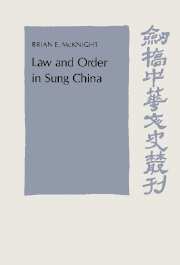Book contents
- Frontmatter
- Contents
- List of figures, maps, and tables
- Preface
- List of abbreviations
- 1 Introduction
- 2 The historical context
- 3 Crimes and criminals
- 4 Informal and semiformal agencies of law enforcement
- 5 Formal civil agencies of law enforcement
- 6 The role of the military in law enforcement
- 7 Supervision of law enforcement – the role of the intendants
- 8 Personnel selection
- 9 Urban crime and urban security
- 10 The Sung penal system
- 11 Jails and jailers in the Sung
- 12 Penal registration
- 13 The death penalty
- 14 Modifications of penalties
- 15 Conclusion
- Glossary
- Bibliography
- Index
12 - Penal registration
Published online by Cambridge University Press: 23 December 2009
- Frontmatter
- Contents
- List of figures, maps, and tables
- Preface
- List of abbreviations
- 1 Introduction
- 2 The historical context
- 3 Crimes and criminals
- 4 Informal and semiformal agencies of law enforcement
- 5 Formal civil agencies of law enforcement
- 6 The role of the military in law enforcement
- 7 Supervision of law enforcement – the role of the intendants
- 8 Personnel selection
- 9 Urban crime and urban security
- 10 The Sung penal system
- 11 Jails and jailers in the Sung
- 12 Penal registration
- 13 The death penalty
- 14 Modifications of penalties
- 15 Conclusion
- Glossary
- Bibliography
- Index
Summary
Introduction
The Sung government, like governments of all dynasties during the Chinese empire, frequently used deprivation of liberty plus forced labor as a penalty. The Sung punishment of forced labor resembled in many ways the forced labor the systems used before (and after) the Sung, but during the Sung these inherited practices were modified to create a distinctive pattern. During the Sung most laboring convicts were registered in special units of the army stationed alongside regular army units. Some of these regular units might be actual fighting troops, like the imperial armies (chin-chün). Many others were, like the convict units, actually labor battalions, the so-called provincial armies (hsiang-chün). Men serving in the nonconvict labor units of the provincial armies received distinctly better treatment than did the men in the convict units. The convicts were encouraged to behave well by the knowledge that they would have opportunities to move up into these better-treated units after completing their term of convict labor or after one of the frequent Sung acts of amnesty. They were encouraged by the constant presence of examples of how their lot might be improved and yet were kept under military discipline and control by the presence of other army men, who always outnumbered those in the convict units.
Liberty penalties in early China
The earliest Chinese sources describing punishments emphasize corporal punishments, making the body suffer; sources from later periods mention penalties based on the restrictions on liberty. The “Punishments of Lu” section of the Book of Historical Documents, a late Chou document that purports to be from the early Chou, speaks not only of the five corporal punishments but also of the Five Exiles.
- Type
- Chapter
- Information
- Law and Order in Sung China , pp. 385 - 445Publisher: Cambridge University PressPrint publication year: 1992



